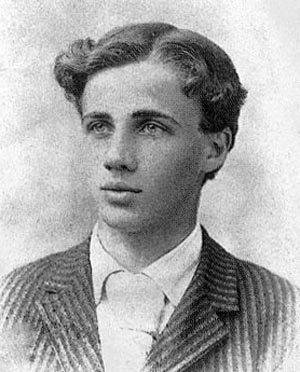On November 6, 1894, depressed and lonely, this unobtrusive
young man took the train from Boston to New York. He had very
little money. From there he boarded a ship to Norfolk, Virginia.
His goal was to see the great Dismal Swamp. He was headed to
a desolate place, a place he had read about. Once in
Norfolk, he walked to the Deep Creek area, about 8 miles. The
road he traveled was built alongside the Dismal Swamp Canal.
There he saw lots of logs being transported to the area sawmills.
Once he arrived at the great Dismal Swamp, he entered slowly into
its dark, dismal area, walking further and further into
the unknown and treacherous swamp. This was a perfect place
to die. Darkness was all around him. But, then like a
miracle, he looked up and saw in the distance a light flickering
in the darkness. It was the lockkeeper's light. He began to walk
out of the darkness toward this light. That small light pulled
him back to his senses. His suicidal ideas soon faded.
Once out of the swamp, he asked a local man where the closest
town was. He was out of money, but it would be the loggers,
hunters and strangers that gave him food and shelter until he
got to Elizabeth City. Even a few hobos gave a helping hand
with tips how to board a freight train to get back home.
Once in Baltimore, Maryland, he was able to contact his mother
and she sent him money to buy a ticket for home.
This could be a modern day American story that we read and hear about
so often. Stories like this touch our lives, but not many stories
are submerged like this one in the past. Like so many individuals
he too struggled from depression brought on by rejection and
the ordinary pressures of daily life. Who was this man that was
so depressed in 1894?
This man would become one of American’s best loved and modern-day
poets. He would become the Poet Laureate of Vermont. He won
four Pulitzer Prizes in poetry and was the winner of the Congressional
Medal of Honor for Poetry in 1960.
His name was Robert Frost (1874-1963)
* * * * * *
Robert B. Hitchings is a seventh generation Norfolk resident, graduating
with an Associate's Degree in Biology from Old Dominion University
and BA in history from Virginia Wesleyan University. During his
studies he was awarded a scholarship at Emmanuel College, Cambridge,
England, and he was an exchange student at Brooks-Westminster College,
Oxford, England. From 1999-2014 he worked as head of the Sargeant
Memorial History Room at Norfolk Public Library, and since then
has headed the Wallace History Room at Chesapeake Public Library.
He is also the President of the Norfolk County Historical Society,
and for six years was a columnist for The Virginian-Pilot. Robert may be reached at nchs.wallaceroom@gmail.com
